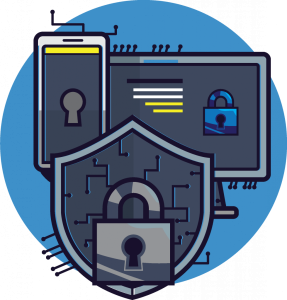Cyber-attacks detection and prevention
3. Criminal law protection against cybercrime
3.3. Substantive aspects of cybercrime in Portugal
The main feature of the Sources regarding cybercrime in the Portuguese Legal System is their dispersion. Even being in place a Cybercrime Law, following the Budapest Convention and implementing Council Framework Decision 2005/222/JHA, offenses specifically implying the use of ICT systems were allocated to several other acts, including the Criminal Code. Besides, since 1991, crimes related to personal data protection are considered as different from cybercrimes in general, almost with parallel typicalities.
Thus, according to the Portuguese Legal System, cybercrimes can be classified according to many different criteria. One of the most commonly used classifications of cybercrime is the above-mentioned classification into:
a) criminal offences in the commission of which the means of information and communication technologies are the subject of protection:
- Illegal access (Art. 6 of Cybercrime Law)
- Computer sabotage [Illegal interference] (Art. 5 of Cybercrime Law)
- Illegal interception (Art. 7 of Cybercrime Law)
- Damage to computer programmes or other computer data [Data interference] (Art. 4 of Cybercrime Law)
- Misuse of devices (Arts. 4(3), 5(2), 6(2) and 7(3) of Cybercrime Law)
- Illegal reproduction of protected computer programme (Art. 8 of Cybercrime Law)
- Illegal reproduction or communication of a copyright protected database (Art. 11 of Decree-Law No. 122/2000)
- Removal or alteration of any electronic rights-management information (Arts. 217 to 219 and 224-224 of the Codeof Copyright and RelatedRights)
- Breach of the exclusive rights on topographies of semiconductor products (Art. 318 of the Industrial Property Code)
- Breach of correspondence or telecommunications (Art. 194 of the Criminal Code)
b) criminal offences in which the means of information and communication technologies are used to commit a criminal offence:
- Inappropriate access to personal data (Art. 47 of Law No. 58/2019)
- Incompatible use of personal data with the purpose of processing (Art. 46 of Law No. 58/2019)
- Misappropriation of personal data (Art. 48 of Law No. 58/2019)
- Tampering or destruction of personal data (Art. 49 of Law No. 58/2009)
- Entering of false personal data (Art. 50 of Law No. 58/2009)
- Breach of secrecy related to personal data (Art. 51 of Law No. 58/2009)
- Disobedience [to the National Commission for the Protection of Data] (Art. 52 of Law No. 58/2009)
- Illegal processing of sensitive personal data (Art. 193 of the Criminal Code)
- Aggavated breach of privacy (Arts. 191(1)(b) and 197(b) of the Criminal Code)
- Inappropriate access to personal data in criminal justice (Art. 53 of Law No. 59/2019)
- Misappropriation of personal data in criminal justice (Art. 54 of Law No. 59/2019)
- Incompatible use of personal data with the purpose of processing in criminal justice (Art. 55 of Law No. 59/2019)
- Illegal Interconnection of personal data in criminal justice (Art. 56 of Law No. 59/2019)
- Qualified disobedience [to the National Commission for the Protection of Data] in criminal justice (Art. 57 of Law No. 59/2019)
- Entering of false personal data in criminal justice (Art. 58 of Law No. 59/2019)
- Revenge pornography related to domestic violence (Art. 152(2)(b) of the Criminal Code
- Offences related to child pornography (Art. 176 of the Criminal Code)
- Solicitation of children for sexual purposes (Art. 176-A of the Criminal Code)
- Computer-related forgery (Art. 3 of Cybercime Law)
- Counterfeiting of cards and other non-cash means of payment (Art. 3-A of Cybercime Law)
- Computer [and telecommunications]-related fraud (Art. 221 of the Criminal Code)
- Use of counterfeited cards and other non-cash means of payment (Art. 3-B of Cybercime Law)
- Acquisition of counterfeited cards and other non-cash means of payment (Art. 3-C of Cybercime Law)
- Misuse of devices related to the Counterfeiting of cards and other non-cash means of payment (Art. 3-D of Cybercime Law)
- Acquisition of of counterfeited cards and other non-cash means of payment obtained by computer crimes (Art. 3-E of Cybercime Law)
With indirect connections, these felonies might also be mentiones:
- Sexual Harassment (Art. 170 of the Criminal Code)
- Insult (Art. 181 of the Criminal Code)
- Defamation (Art. 180 of the Criminal Code)
- Breach of privacy (Art. 192 of the Criminal Code)
- Discrimination and incitement to hate and violence (Art. 240 of the Criminal Code)
- Counterfeiting of copyrighted works (Art. 196 of the Code of Copyright and Related Rights)
- Copying, distribution and selling of copyrighted works (Art. 195 of the Code of Copyright and Related Rights)
